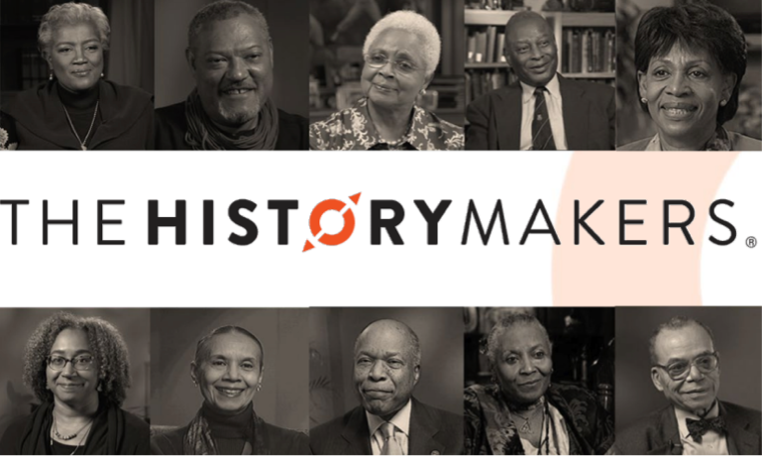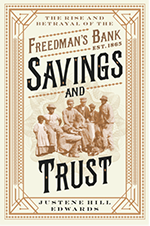This Black History Month, librarians on the Arts & Humanities team invite you to explore stories of the African American experience from the past two centuries.
Featured in this post are two collections of primary sources for historical research, a biography of a Union Army soldier, and a history of the Freedman’s Bank by UVA history professor Justene Hill Edwards.
Recommendations from Sherri Brown, Librarian for English and Digital Humanities

If you want to hear about the life experiences of prominent African Americans from across the U.S., check out The HistoryMakers Digital Archive, an oral history collection with video interviews from over 2,700 individuals (click “Access through your Institution” and then log in through the University of Virginia).
The first interviews included in the archive date back to 1993, and new interviews are ongoing. Interviewees share their experiences and thoughts on various topics, with the oldest memories dating as far back as the 1890s.
You can search the video archive by topics or keywords or just choose a person and listen to their whole collection of stories.
Of local interest is an interview with UVA’s own Rita Dove, interviewed in 2007. Did you know that her parents met playing a game of ping pong? Find out the details and much more about Dove’s life in her own words on HistoryMakers. Fascinating stories abound!
Recommendations from Kristal Sergent, Associate Librarian for African American and African Studies

Researching an event or historical figure for class? Or getting started on a local history project?
ProQuest Historical Newspapers – Black Newspapers is a portal into the past, with news articles, photographs, obituaries, editorials, and more. This digital collection is an essential resource for anyone researching African American life in the 20th century.
Included in this collection are seven prominent Black print newspapers: Atlanta Daily World, The Baltimore Afro-American, Chicago Defender, New York Amsterdam News, The Norfolk Journal and Guide, Philadelphia Tribune, and Pittsburgh Courier.
The collection includes materials published from the early 1900s to 2010, with content from The Baltimore Afro-American dating back to 1893.
Historical newspapers are a treasure trove of content including social updates, personal announcements, and reviews of local events. The newspapers in this collection reported on Black life from across the country. Readers routinely submitted news and personal updates to be read by a national audience.
Use the “Advanced Search” feature to limit results to different document types including front page article and classified ad.
Browse ProQuest Historical Newspapers – Black Newspapers today to get hands-on experience researching American history.
Recommendations from Keith Weimer, Research Librarian for History and Religious Studies
 Dean Calbreath’s 2023 book “The Sergeant: The Incredible Life of Nicholas Said: Son of an African General, Slave of the Ottomans, Free Man Under the Tsars, Hero of the Union Army” — and one might add, teacher in the Reconstruction South — reads like a travelogue of much of the mid-19th century world and of its Black Diaspora. Said was born in central Africa into the Kingdom of Borno’s aristocracy, captured by Tuareg raiders and sold to Ottoman aristocrats in Libya and then Istanbul before becoming indentured to a Russian prince and then making his way to the United States. Never enslaved in America, he served in the 55th Massachusetts infantry in Florida and South Carolina before writing his memoirs and passing mysteriously from the historical record in the 1880s.
Dean Calbreath’s 2023 book “The Sergeant: The Incredible Life of Nicholas Said: Son of an African General, Slave of the Ottomans, Free Man Under the Tsars, Hero of the Union Army” — and one might add, teacher in the Reconstruction South — reads like a travelogue of much of the mid-19th century world and of its Black Diaspora. Said was born in central Africa into the Kingdom of Borno’s aristocracy, captured by Tuareg raiders and sold to Ottoman aristocrats in Libya and then Istanbul before becoming indentured to a Russian prince and then making his way to the United States. Never enslaved in America, he served in the 55th Massachusetts infantry in Florida and South Carolina before writing his memoirs and passing mysteriously from the historical record in the 1880s.
 Justene Hill Edwards’ (of UVA’s Department of History) “Savings and Trust: The Rise and Betrayal of the Freedman’s Bank” demonstrates how disadvantages in access to wealth and power made it difficult for freedmen to benefit financially after emancipation. Founded in 1865 to provide newly freed African Americans with opportunities not afforded by white-owned institutions, the Freedman’s Bank at first pursued a conservative investment strategy in bonds secured by the U.S. government. Low returns to depositors became a justification for the Bank’s trustees to pursue a more aggressive approach of loans to wealthy white investors, including cronies of the trustees, which amounted to predation on the depositors. Overextended loans helped cause the Bank’s collapse in 1874. The very trust Black depositors had placed in the institution was used by white supremacists — especially Democratic Congressmen — as evidence of their financial immaturity. The depositors doggedly though fruitlessly worked with Congressional allies to obtain redress into the 20th century.
Justene Hill Edwards’ (of UVA’s Department of History) “Savings and Trust: The Rise and Betrayal of the Freedman’s Bank” demonstrates how disadvantages in access to wealth and power made it difficult for freedmen to benefit financially after emancipation. Founded in 1865 to provide newly freed African Americans with opportunities not afforded by white-owned institutions, the Freedman’s Bank at first pursued a conservative investment strategy in bonds secured by the U.S. government. Low returns to depositors became a justification for the Bank’s trustees to pursue a more aggressive approach of loans to wealthy white investors, including cronies of the trustees, which amounted to predation on the depositors. Overextended loans helped cause the Bank’s collapse in 1874. The very trust Black depositors had placed in the institution was used by white supremacists — especially Democratic Congressmen — as evidence of their financial immaturity. The depositors doggedly though fruitlessly worked with Congressional allies to obtain redress into the 20th century.
